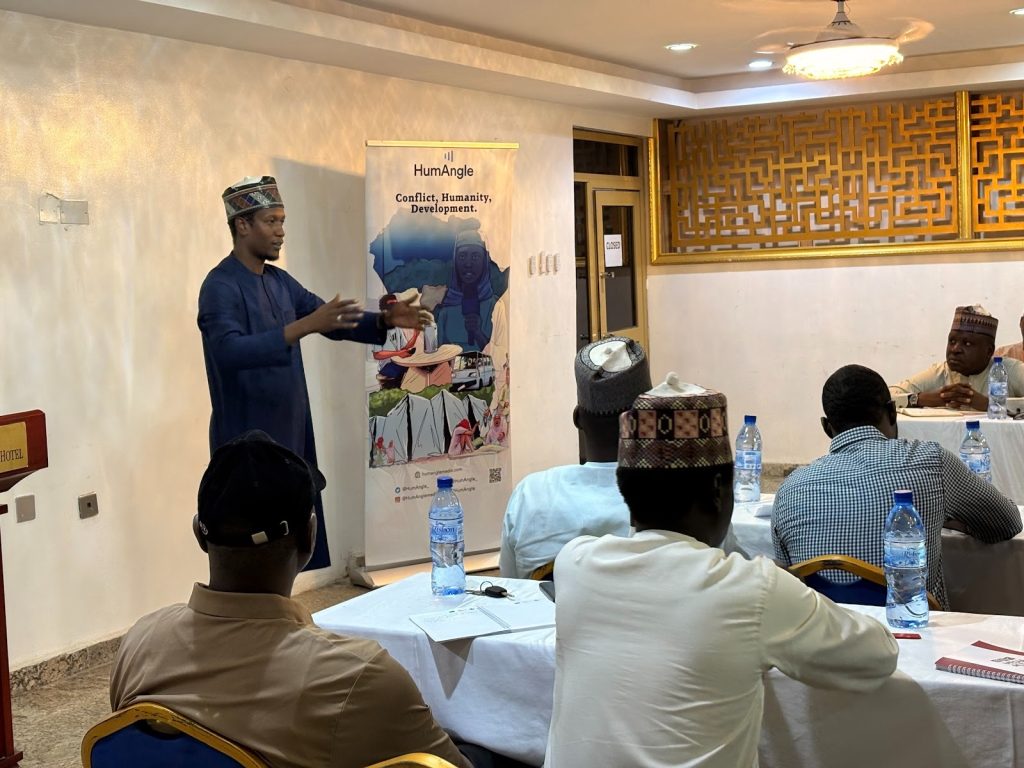Journalists and Civil Society Organisations (CSOs) have joined forces to seek justice for 42 men arbitrarily detained and tortured by the Nigerian military in Borno State, North East Nigeria.
During an advocacy meeting organised by HumAngle and Amnesty International in Maiduguri, the state capital, on Wednesday, Oct. 22, civic leaders and media practitioners took a step to spotlight an investigation that opened a can of worms on the gross violation of human rights.
The survivors were present at the meeting to share first-hand accounts of how they endured years of torture, abuse, and brutal treatment in detention. They were accompanied by some of their relatives, who waited over a decade for their return.
One survivor lost his sight while in detention, another lost an ear, and the other bore scars all over his body. Their stories cast a sombre mood over the room, as participants and advocates reflected on how to achieve transitional justice for the victims.
Usman Abba Zanna, the HumAngle reporter who investigated the case for months, detailed how he followed a lead from local sources and made several visits to Gallari, a rural community in Borno’s Konduga Local Government Area, to verify claims of military invasions and arbitrary arrests.
“In a conflict situation like this, there are so many cases of violation of humanitarian laws and war crimes by state actors. These men were the breadwinners of their families, and the military just arrested all of them,” Zanna narrated to the audience, stating that the arrest happened immediately after the Chibok schoolgirls’ abduction in April 2014.
“When I went to Gallari, I met a 16-year-old boy who told me that they had arrested his father. He was now saddled with all the responsibilities of the family, including caring for her grandmother, who cried until she became blind. He travels far away to work and raise money to fend for his younger ones,” he added.
In his remarks, Isa Sanusi, the Country Director at Amnesty International in Nigeria, reiterated the organisation’s efforts in documenting human rights violations amid insurgency and armed violence in the region. He said the organisation’s recent partnership with HumAngle is another move to seek accountability.
“One of the issues that we consistently talk about is the issue of accountability. Many people believe that the only way to bring peace is just to say that schools are being rebuilt and people are being forced to return to their communities,” he said, urging stakeholders in the meeting to take necessary actions.
“So many people are always asking: How are we going to have accountability, and how is it going to work? This is the reason we’re here. Amnesty International and HumAngle are partners in making sure that we seek accountability in this case.”
Hauwa Shaffii Nuhu, HumAngle’s Managing Editor, corroborated this sentiment, saying: “Journalism and advocacy are some of the most effective tools with which to correct the ills in society. Through the gathering today, we are merging both so that the suffering of people like the Gallari men and all other victims of enforced disappearances can have their stories heard. This is in the hopes that targeted advocacy towards stakeholders will elicit positive action from them.”
The raid that led to the arrests shattered the civilian community, leaving children, wives, and the elderly in displacement, poverty, and forcing some to remarry or assume breadwinning responsibilities prematurely.
Ten years later, in 2024, HumAngle revisited the incident, documenting the fate of the forgotten men. Three of them were released following our investigation a few months later. When we visited them after their return, we found an even more disturbing revelation: 37 of the 42 men detained had died gruesomely in detention, and those still alive carry their grief and scars around.
Journalists and Civil Society Organisations (CSOs) are advocating for justice for 42 men who were detained and tortured by the Nigerian military in Borno State.
At an advocacy meeting organized by HumAngle and Amnesty International, survivors shared their harrowing experiences of abuse during detention, highlighting the severe human rights violations they endured over the years. The arrests followed the notorious abduction of the Chibok schoolgirls in 2014 and severely impacted the detained men’s families, who were left in poverty and displacement.
Investigative journalist Usman Abba Zanna uncovered evidence of these abuses while visiting Gallari, where he met families shattered by these wrongful arrests. Amnesty International emphasized the importance of accountability for human rights abuses, partnering with HumAngle to document and promote awareness of such violations.
The partnership seeks to hold perpetrators accountable and spur action from stakeholders to prevent further abuses. Notably, out of the 42 originally detained, 37 men died in custody, underscoring the urgency for justice and reform.
